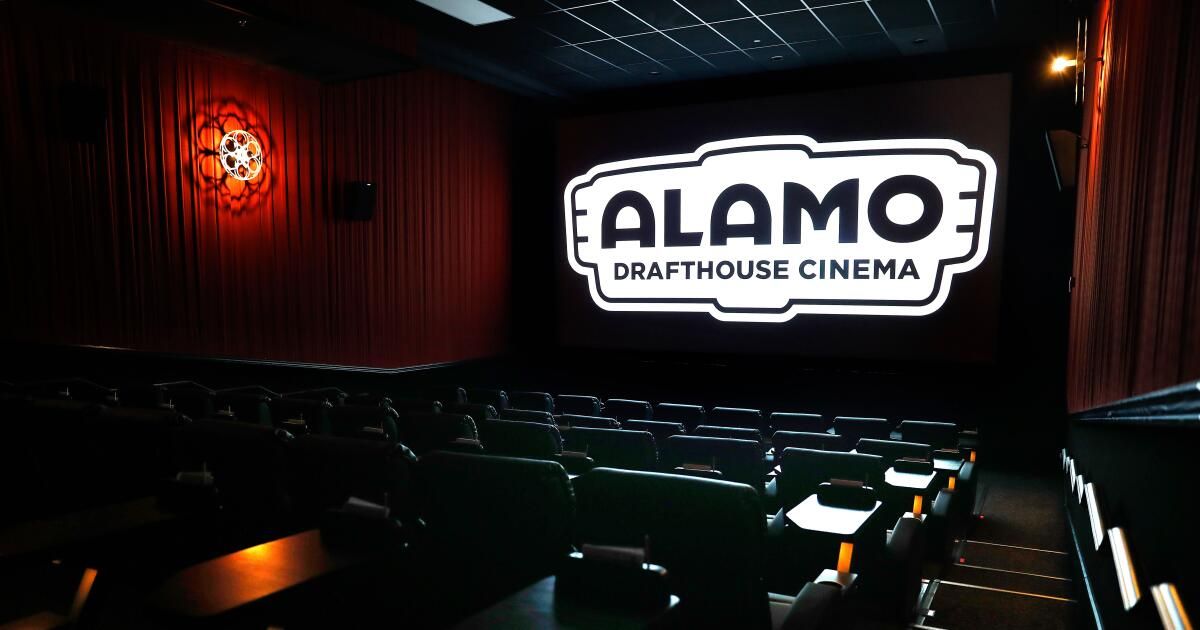Sony Pictures Entertainment has purchased Alamo Drafthouse Cinema, the innovative dine-in theater chain known as a premier movie destination, including at its downtown Los Angeles location.
The Culver City-based studio said Wednesday that the quirky Austin, Texas-based exhibition company would be placed under its newly created Sony Pictures Experiences division, led by Alamo Drafthouse's Michael Kustermann.
Kustermann will continue as CEO of the cinema chain.
Sony did not disclose the price of the deal, but promised to “preserve Alamo Drafthouse's distinctive cinematic dining experience.” The exhibitor, which has 35 locations in major U.S. cities including Los Angeles, San Francisco, Chicago, Boston, Austin and New York, is known for serving food and craft beer in its theaters.
It's also famous for its strict no-texting policy and special screenings, which have made it a paradise for moviegoers. The chain periodically organizes themed “movie parties” inspired by certain titles. (Upcoming film screenings at the Los Angeles venue include 2007's “Hot Fuzz,” 1984's “Purple Rain” and 1939's “The Wizard of Oz.”)
“Alamo Drafthouse's differentiated movie experience, admired brand and devoted community fit well with this vision,” Ravi Ahuja, president and chief operating officer of Sony Pictures Entertainment, said in a statement. “We look forward to building on the innovations that have made Alamo Drafthouse a success, and of course we will continue to welcome content from all studios and distributors.”
Alamo Drafthouse says it is the seventh-largest movie theater chain in North America. In a limited sense, Sony's acquisition of Alamo is a throwback to the Golden Age of Hollywood, when major studios also owned and operated their own theater chains, thus controlling production, distribution and exhibition.
This system of vertical integration triggered a major antitrust case that resulted in a U.S. Supreme Court decision in 1948 that effectively broke up studio oligopolies. In a series of deals known as Paramount decrees, the studios agreed to sell their theatrical assets.
However, during the Trump administration, the Justice Department suspended the decrees, considering them obsolete.
Unsurprisingly, Sony's acquisition of Alamo Drafthouse has ignited online discourse, with some suggesting that the movie business is on a slippery slope that appears increasingly vertical.
“Maybe that comparison could come into play,” said Shelleen Greene, a professor of film and media studies at UCLA. “But it's also a very different time. …This is another sign that we are acclimating to a change in moviegoing, viewership, and the continued adjustment to streaming services.”
Greene sees this moment not so much as a sign of a return to vertical integration, but as another effort by studios to increase movie attendance, “reimagine the moviegoing experience” and remain relevant.
“Alamo is a different type of exhibition space,” Greene said. “This is not a passive vision of cinema. … That's what Sony is looking for in the future.”
Today, entertainment companies control production, distribution and exhibition in a different sense: most of the parent companies of the big studios own streaming services. Sony is the only major studio without a mass-market streamer that can compete with Netflix, although it does offer some niche direct-to-consumer services, including the anime channel Crunchyroll.
Restrictions on studios owning theaters were relaxed in the decades after the decrees, as studios began to dip their toes into exhibition space.
For a time, Sony owned the Loews movie theater chain, which is now part of AMC. Paramount Pictures and Warner Bros. owned the Mann Theater chain for many years.
Disney has long operated El Capitan on Hollywood Boulevard, where it screens its movies and hosts special events. Netflix acquired the famous Egyptian Theater on Hollywood Boulevard from American Cinematheque, as well as the Bay Theater in Pacific Palisades, where it also screens its own films.
In recent years, the line between exhibition and distribution has become increasingly blurred, with major exhibitors like AMC Theaters releasing titles directly into their own theaters. After “Taylor Swift: The Eras Tour” ranked among the top-grossing films of 2023, AMC has indicated that it intends to dive deeper into the distribution pool in the future.
“What were once narrower categories … are now becoming much more fluid,” Greene said. “It's a period of experimentation.”
For the record:
12:38 pm June 12, 2024An earlier version of this post incorrectly stated that the Los Angeles Alamo Drafthouse location was the exhibitor's only theater in California.
Under Sony, Alamo Drafthouse will maintain all of its existing locations, including its only Southern California theater, which opened in downtown Los Angeles in 2019.
The studio acquired exhibitor private equity firms Altamont Capital Partners, Fortress Investment Group and founder Tim League, who launched Alamo Drafthouse with a single-screen repertory theater in Austin with his wife, Karrie, in 1997.
Like many theater operators, Alamo Drafthouse struggled in the wake of the COVID-19 pandemic, which closed theaters for months. The company filed for Chapter 11 bankruptcy protection in 2021, citing issues related to the pandemic.
It emerged from bankruptcy under the ownership of a group of senior creditors, which included Altamont and Fortress.
Movie theater chains continue to face challenges as the box office struggles to recover from the pandemic. So far this year, ticket sales in the US and Canada are down 26% compared to the same period in 2023, according to Comscore.
“We are excited to make history with Sony Pictures Entertainment and have found the right home and partner for Alamo Drafthouse Cinema,” Kustermann said in a statement. “We were created by movie lovers for movie lovers. “We know how important this is to Sony and it is further proof of their commitment to the theatrical experience.”
A handful of Alamo Drafthouse franchises recently closed in the Dallas-Fort Worth area, citing poor box office.












